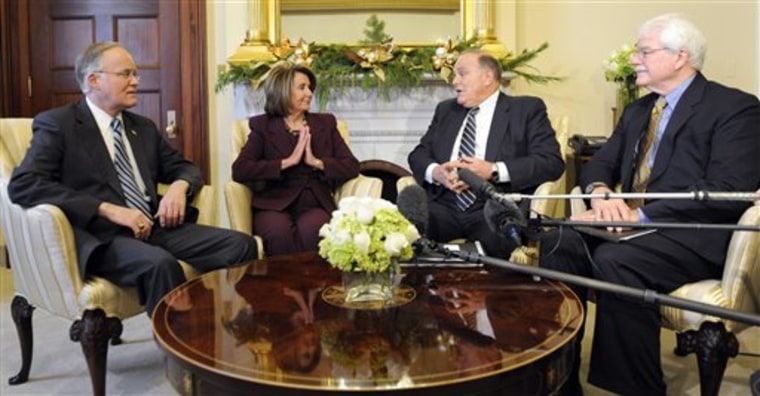Facing severe cutbacks in state services as the recession deepens, the nation's governors pressed their case on Capitol Hill Monday, asking for at least $40 billion to help pay for health care for the poor and disabled.
The governors are also pressing for as much as $136 billion worth of infrastructure projects like road and bridge repairs as the Democratic-controlled Congress and President-elect Barack Obama prepare economic recovery legislation that Obama hopes to sign immediately upon taking office.
Obama will meet with the governors Tuesday at a National Governors Association meeting in Philadelphia.
In advance, Govs. Ed Rendell, D-Pa., and Jim Douglas, R-Va., who head the governors' group, met with House Speaker Nancy Pelosi on Monday to discuss the parameters of the evolving measure, which could total $500 billion, according to Senate Majority Leader Harry Reid, D-Nev.
For states, the recession has meant big reductions in tax revenues, which has forced 43 of the 50 states into budget deficits. Since virtually every state has to live under a balanced budget, governors have been forced to cut services, lay off workers and consider tax increases.
Such moves only make the economic situation more difficult, the governors say.
'We simply need help'
"Without federal help ... what we will have to do is just make continuing cuts and/or raise taxes, both of which would have a further deleterious effect on our states' economy. We simply need help," Rendell told reporters. "When the economy is bad, the social service net demands grow."
Rendell said there are upward of $136 billion in infrastructure projects that are "ready to go," chiefly road and bridge repair projects can get started especially quickly. Water and sewer projects and school repairs are other needs.
Pelosi, D-Calif., said Democrats will work to have the economic stimulus measure ready for Obama's signature as soon as he takes office Jan. 20.
It's expected to blend funding for infrastructure projects and Medicaid aid to the states with tax cuts, a temporary increase in food stamp payments, as well as investments in renewable energy projects and other "green jobs" initiatives.
"It's going to be about innovation and about the future, about building the jobs of the 21st century," Pelosi said.
Backers of infrastructure spending say its a surer way to create jobs than, for example, the $600-$1,200 tax rebate checks sent out to individuals and couples this year. And they can provide lasting economic benefits.
Skeptics say that infrastructure spending is relatively slow-acting and that its effects won't be fully felt until the economy is already on the improve.
Huge recovery bill
Obama has called for a huge economic recovery bill to generate 2.5 million jobs over his first two years in office. The measure will dwarf a $61 billion bill passed by the House before Congress adjourned for the elections. The measure stalled in the Senate.
The governors found a sympathetic ear in Pelosi, who supports helping states pay for Medicaid by temporarily increasing the percentage of program costs covered by the federal government.
The federal government gave $20 billion to the states in 2003 as part of an economic stimulus plan signed by President Bush. Douglas, the Vermont governor, said the upcoming measure should provide two years' worth of help for states straining to meet their Medicaid burdens.
Douglas wouldn't give a figure, but said the states are looking for more help than the $20 billion they got in 2003. Without the help, fewer poor people will receive care, and states might have to shift scarce resources from other programs to ease the medicaid pinch.
"We'd certainly be looking for something higher than that," Douglas said.
States have already been forced into $53 billion worth of budget cuts and are facing a cumulative shortfall of about $90 billion in the coming year, Rendell said.
"States are not just coming to Washington with our hands out," Douglas said
